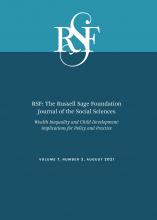Abstract
Wealth inequality in the United States has increased tremendously over the last several decades and has potentially serious repercussions for disparities in child well-being. Household debt, a key component of wealth, may also play a role in such disparities. In this study, we explore the associations of parents’ unsecured debt with children’s socioemotional well-being. Using data from the Fragile Families and Child Wellbeing Study, we compare the associations of mothers’ unsecured household debt, fathers’ unsecured household debt, and fathers’ child support arrears with socioemotional outcomes among nine- and fifteen-yearold children who have a nonresident father. We find robust evidence that nonresident fathers’ child support arrears, but not other types of parental household debt, are associated with worse outcomes and that these associations become stronger as children age.
- © 2021 Russell Sage Foundation. Nepomnyaschy, Lenna, Allison Dwyer Emory, Kasey J. Eickmeyer, Maureen R. Waller, and Daniel P. Miller. 2021. “Parental Debt and Child Well-Being: What Type of Debt Matters for Child Outcomes?” RSF: The Russell Sage Foundation Journal of the Social Sciences 7(3): 122–51. DOI: 10.7758/RSF.2021.7.3.06. Direct correspondence to: Lenna Nepomnyaschy at lennan{at}ssw.rutgers.edu, Rutgers School of Social Work, 120 Albany St., New Brunswick, NJ 08901, United States.
Open Access Policy: RSF: The Russell Sage Foundation Journal of the Social Sciences is an open access journal. This article is published under a Creative Commons Attribution-NonCommercial-NoDerivs 3.0 Unported License.






